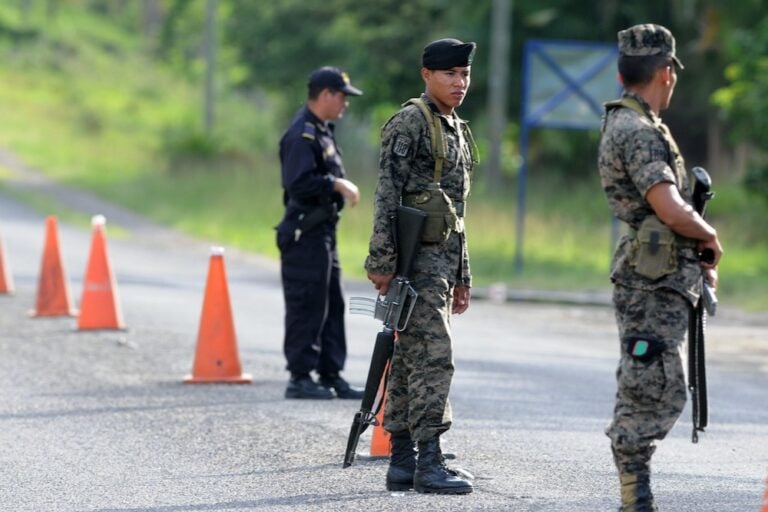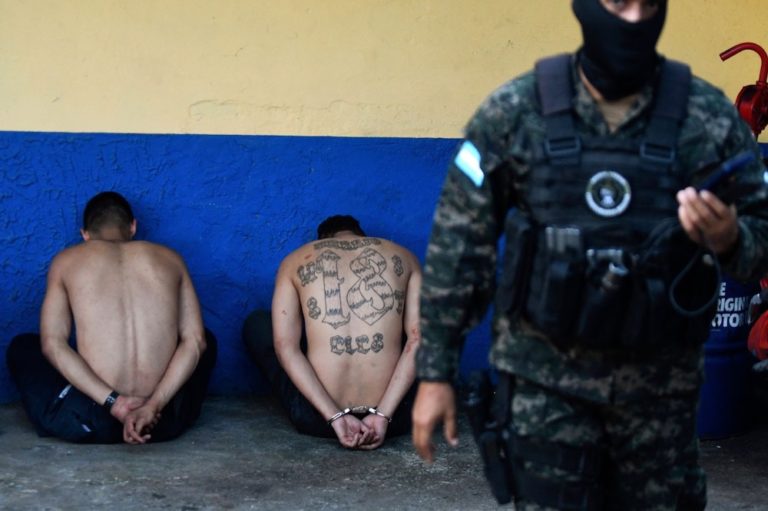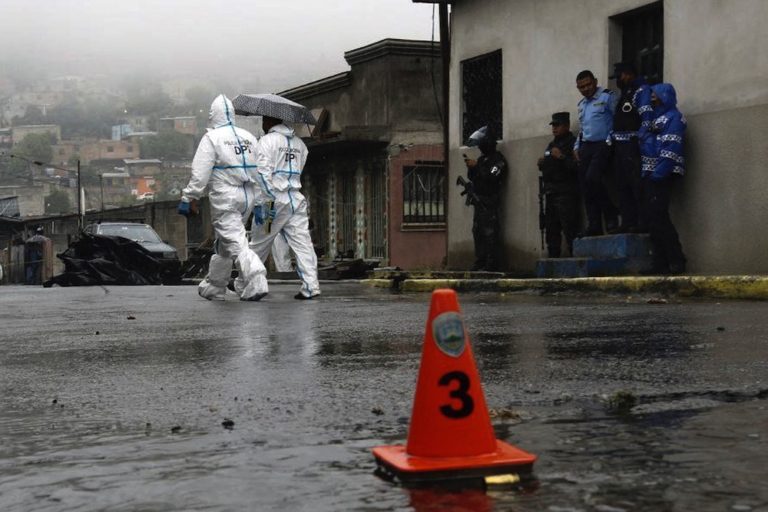The Penal Appeals Court in the capital Tegucigalpa has ruled that a 16-month journalism ban against Julio Ernesto Alvarado, originally handed down in December 2013 as a part of a sentence for criminal defamation, should be reinstated.
This article was originally published on pen-international.org on 1 October 2014.
The 16-month ban on practising journalism imposed on Globo TV news anchor and PEN member Julio Ernesto Alvarado as a result of his coverage of alleged corruption by a dean at a state-run university in 2006 is a deeply disturbing development, PEN International said today [1 October 2014].
The Penal Appeals Court in the capital Tegucigalpa has ruled that the journalism ban, originally handed down in December 2013 as a part of a sentence for criminal defamation, should be reinstated. The ruling – made on 22 August 2014 but only communicated to Alvarado’s lawyer on 26 September – was made despite the fact that Alvarado paid a fine in April in order to lift the prohibition along with a prison sentence of the same length.
PEN is also concerned by reports that Alvarado has been followed on two occasions since he was notified that the work ban has been reinstated, heightening concerns for his safety.
“For eight years, Mr Alvarado has been trapped in a web of judicial harassment and un-investigated threats,” said Marian Botsford Fraser, chair of PEN International’s Writers in Prison Committee. “His case is a mockery of justice, and part of an alarming climate of violence, impunity and fear in Honduras.”
PEN considers Alvarado’s conviction to be politically motivated and urges the Honduran authorities to review his case as a matter of urgency, and to ensure that he is not imprisoned. PEN also calls on the authorities to investigate the threats and intimidation faced by the journalist and to provide him with immediate protection.
Alvarado is a founding member of PEN Honduras, formally welcomed today as a PEN Centre at the 80th PEN International Congress in Bishkek, Kyrgyzstan.
Case details
Director and presenter of the news programme ‘Mi Nación’ on the opposition station Globo TV, Alvarado was originally sentenced on appeal in December 2013 to 16 months in prison and a ban on practising journalism for the same period as a result of a criminal defamation lawsuit brought by Belinda Flores, dean of the Economic Science Faculty of the National Autonomous University of Honduras (Universidad Autónoma de Honduras – UNAH). Alvarado had covered Flores’ alleged involvement in influence peddling and falsification of university degrees in three editions of ‘Mi Nación’ in 2006.
Alvarado and two university teachers who had appeared on his show to discuss the allegations were cleared of the charges in March 2011. However Flores appealed the decision and in December 2013 the Supreme Court of Justice in Tegucigalpa convicted Alvarado of criminal defamation – despite the fact that the non-guilty verdict was upheld for the two teachers and that the Court took as proven that Flores was in fact implicated in some wrongdoing.
Following his conviction, Alvarado was subject to harassment and threats in early 2014 via both his Facebook page and that of journalist and human rights defender Dina Meza, who made various posts protesting Alvarado’s sentence. One post to Alvarado’s Facebook account dated 7 February threatened him and his family members with death.
PEN International protested Alvarado’s conviction as politically motivated and called on the authorities to investigate the threats against him. Alvarado previously endured months of threats and harassment which culminated in a suspected attempt on his life, and led him to suspend his radio programme on Radio Globo in March 2013. He briefly restarted the programme in October 2013 but had to suspend it again after a few months due to escalating threats. These attacks have not been investigated, let alone prosecuted.
As a result of this intimidation and a lack of faith in the impartiality of the justice system, Alvarado decided not to appeal his conviction, opting instead to pay a fine of 10 lempiras per day of his sentence (around US$250 in total) in April in order to avoid imprisonment. As a result the ban on practising journalism was also lifted.. However, on 2 May Flores’ lawyer appealed the judge’s decision to overturn the work ban imposed on Alvarado.
Following the reinstatement of the work ban on 26 September, Alvarado, via his lawyer Kenia Oliva Cardona, requested the court to reconsider its decision. This represents the final stage of appeal.
Flores reportedly intends to launch civil defamation proceedings against Alvarado once the criminal case is finalised. If such a law suit is successful, she could be awarded large damages which could ultimately lead to Alvarado’s imprisonment, should he fail to pay them.
Renewed security concerns
Alvarado reports being followed on two occasions since his journalism ban was reinstated, heightening concerns for his safety. The first incident took place on 26 September: as Alvarado was driving towards the ring road near the airport in Tegucigalpa mid-afternoon a white car overtook him on a curve, forcing him to slow down. The next day, around the same time in the afternoon and again near the airport, the journalist realised that a black car without licence plates was following him. He stopped to let the car pass; a few minutes later the same car reappeared and drove past him at great speed.
International appeal
PEN International, in conjunction with Kenia Oliva and Dina Meza – who like Alvarado, are founding members of PEN Honduras – has requested the Inter-American Commission on Human Rights (IACHR) to require Honduras to adopt precautionary measures to protect Alvarado’s right to freedom of expression. PEN’s submission, presented to the IACHR on 29 May 2014, argues that Alvarado is at risk of suffering irreparable harm to his right to freedom of expression via criminal proceedings that have lasted eight years and now threaten to strip him of both his right to work as a journalist and his property.
PEN and its co-petitioners call on the IACHR to request the Honduran state to adopt precautionary measures to avoid such irreparable harm to the rights of Alvarado and society in general. The Honduran state should carry out an effective investigation into Alvarado’s case and prevent the implementation of his sentence, argues the petition, which also calls on the state to provide the journalist with police bodyguards in order to protect his life and physical integrity.
The Honduran state has to date failed to respond to the IACHR’s requests for information about Alvarado’s case.
A violent reality
A recent joint PEN shadow report to the United Nations Human Rights Council ahead of the 2015 Universal Periodic Review (UPR) of Honduras’ human rights record highlights how many of the areas of concern in relation to freedom of expression highlighted at the last UPR in 2010 persist or have worsened, while a large number of the advances praised at that time have been seriously undermined.
The shadow report, submitted jointly with PEN Canada and University of Toronto’s International Human Rights Program (IHRP), finds that both murders and non-fatal, violent attacks on journalists have risen sharply in the last few years, despite the state’s pledges to protect journalists and combat impunity. At least 44 journalists have been murdered since 2003, 38 of them since the coup d’état in June 2009 – and six of them this year alone. Convictions have only been obtained in four of these murder cases – an impunity rate of 91 per cent – and even in these, justice is only partial. The vast majority of non-fatal, violent attacks on journalists also go unpunished.
PEN’s shadow report builds on the findings and recommendations of a previous joint report by PEN International, PEN Canada and IHRP, Honduras: Journalism in the Shadow of Impunity , published in January 2014.
In their most recent report the three organisations found that numerous initiatives by the Honduran state to combat impunity have resulted in scant concrete results, and the current and previous administrations have displayed a lack of political will to investigate violations of freedom of expression and to protect journalists.
PEN International condemns this staggering violence and impunity and calls on the Honduran authorities to do everything in their power to safeguard all journalists working in the country. The state must carry out a prompt and thorough investigation into all murders of journalists and ensure that all those responsible – including those who order the killings – are brought to justice. It must develop as a matter of urgency specialised protocols to ensure that any possible links between journalists’ deaths and their professional work are promptly and fully investigated. It should also expedite the approval of a law to create a journalist protection mechanism which is currently before Congress, taking into account civil society concerns, and ensuring adequate resources for meaningful implementation (see report for full recommendations).


